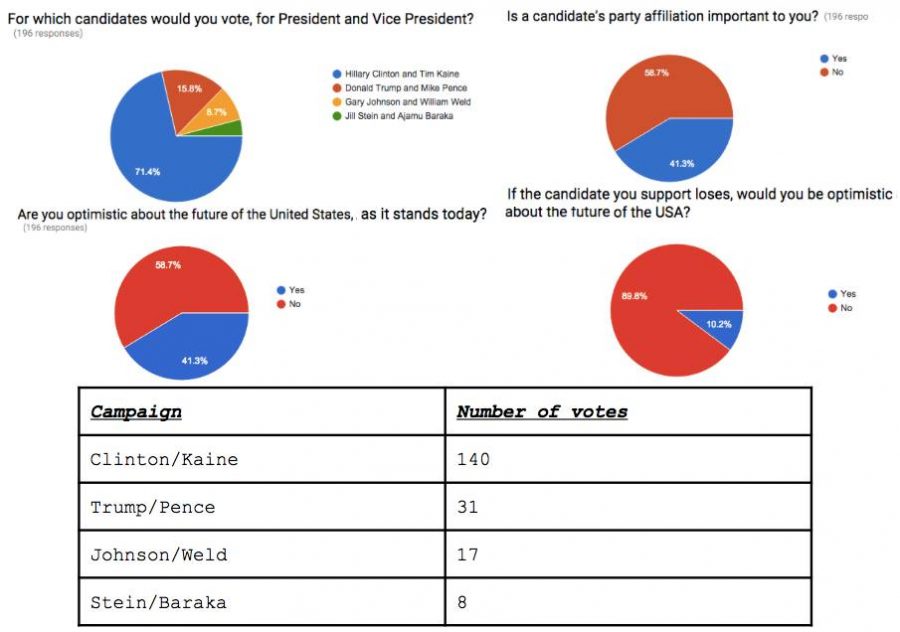WFS Upper School Mock Election
Weekly Update
Visual Results of the Mock Election.
November 17, 2016
In accordance with the 2016 Presidential Election, Wilmington Friends decided to have its own mock election within the Upper School student body. On the day before United States Election Day, students had the opportunity to vote to simulate a small-scale version of the U.S. election. The voting process included questions ranging from whom each student would vote for to rating how important certain issues are to the student. After the election took place, a spreadsheet with raw data was sent out as well as flyers posted around the school displaying more selective results. Through this election and survey, students had the chance to participate in a way to make their voices heard.
The WFS mock election was created and run by the History department as well as the World Affairs Club. History teacher Javier Ergueta explained, “It is a big accomplishment simply to run any mock election at all in a school; administratively it’s a major project. No teacher, including myself, really had the time to do this. So I asked two already extremely busy, but highly conscientious students to take it on, which they did admirably. Gustavo Silveira especially, was helped by Zack Horowitz and Mr. Miller, and carried out this very ambitious project.” Ergueta credited the several students involved in the World Affairs Club, displaying the mock election’s significance in being primarily student-run. Gustavo Silveira ’17 added, “My experience with organizing the mock election was overwhelmingly positive. There was considerable support from faculty–particularly from Javier Ergueta and the rest of the History department–which was to be expected. There was also a surprising level of interest from the student body, across the grades. There were only about 5 responses that were “goof-off” responses (e.g. “helicopter” as a response for “gender”), of the almost 200 student and 37 faculty respondents. These points go to show that interactive events truly do have the ability to provoke discussion and interest in a topic.”
Prompting this discussion in the first question: “for which candidates would you vote for, President and Vice President?” Through analysis of the raw results, Silveira ’17 calculated how many students voted for each candidate along with a corresponding percentage. 140 students, or 71%, denoted that they would vote for Hillary Clinton and Tim Kaine. 31 students, or 16%, indicated that they would vote for Donald Trump and Mike Pence. 17 students, or 9%, voted Gary Johnson and William Weld and 8 students, or 4%, for Jill Stein and Ajamu Baraka. When asked if this had been the same candidate that they preferred during the primary ballot this past spring, 49% of students confirmed that this was the same candidate they would have chosen, while 28% marked that their choice had changed, and the remaining percentage of students expressed that they did not remember. These questions were most comparable to the actual election, then were followed by a diverse range of questions in consideration to the election format.
The subsequent questions explored students’ party affiliations, their parents’ political beliefs, and candidates’ party affiliations. 52% of students affiliated with the Democratic Party, 21% with the Republican Party, 14% with the Independent Party, 6% with other, 5% with the Libertarian Party, and 2% with the Green Party. Another question asked whether a candidate’s party affiliation is important to the student. 41% of students responded that yes, a candidate’s party is important to them. A following question inquired if students felt as though they held the same political beliefs as their parents. 60% of students do feel that they share the same beliefs as their parents, 25% feel that they do not share the same beliefs, and 15% either did not know or did not want to answer. This specific section of the survey became an interesting development to the official election process, giving students a chance to vocalize their feelings toward party affiliation and political beliefs.
An additional feature in the survey portion of the election regarded how important several national and international issues are to the student, on a scale of 1 to 5. These issues included health care, education, security, immigration, foreign policy, the environment, and the economy. Through analysis of the raw results, students Silveira ’17 and Horowitz ’17 calculated a percentage of how many students rated a 5 for each issue. Health care was rated a 5 for 13% of students, education by 34% of students, security for 16% of students, 16% of students for immigration, 19% of students for foreign policy, 26% of students for the environment, and 26% of students for the economy. This section of the survey provided a great opportunity for students to communicate personal significance of issues present in our country and world.
Another distinctive aspect of the survey segment consisted of the questions asked at the end, including inquiries as to whether students felt optimistic about the future of the United States in three simulations: If the candidate you support loses, would you be optimistic about the future of the USA? If the candidate you support wins, would you be optimistic about the future of the USA? Are you optimistic about the future of the USA, as it stands today? 90% of students responded they would not be optimistic if the candidate they supported lost. However, 39% expressed they still would not be optimistic if the candidate they supported won. Ultimately, 59% of students are not hopeful about the future of our country as it currently stands.
In the end, the 2016 WFS mock election proved to be a success with an overwhelmingly positive response from both faculty and students. Thanks to the History department, World Affairs Club, and all those involved, WFS was able to participate in this opportunity, gain insight into the diverse political beliefs within the upper school community, and unite in addressing issues that affect us all.































